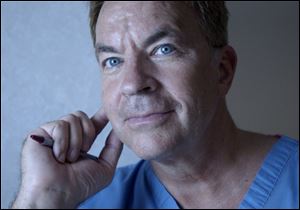
Peer-review fix will aid patients, reformer claims
10/29/2003
Dr. Edward Dench, Jr., says Pennsylvania's current peer-review system is weighted against whistle-blowers.
HARRISBURG, Pa. - One year ago this month, Dr. Edward H. Dench, Jr., addressed fellow physician members of the Pennsylvania Medical Society as their new president, the first from Centre County.
Invoking a theme of advocating for patients, Dr. Dench's top recommendation may have surprised his audience: Adopt a statewide peer review system for evaluating physicians involved in disputes with their hospitals.
Fixing peer review, the process in which groups of doctors evaluate their colleagues to improve care, has been a five-year battle for Dr. Dench, 58, a battle the anesthesiologist now concedes he may lose.
Like other critics, Dr. Dench thinks that hospital-based peer review panels too often are biased in favor of hospital administrators or certain powerful physicians who use their authority to punish doctors who speak up about patient care concerns. Creating a statewide group not attached to a particular hospital would go a long way toward making that system fairer, he believes.
The fruit of Dr. Dench's labors, House Bill 1270, introduced by Centre County State Rep. Kerry Benninghoff, calls for a nine-member statewide panel, including at least one consumer member, and its decisions would be binding on both the physician and the hospital.
But the bill has remained mired in committee for months with little sign that it will ever move out. The bill has faced opposition from the Hospital and Healthsystem Association of Pennsylvania and, Dr. Dench suspects, some in his own medical association who fear outsiders evaluating their work.
Promised legislative hearings this summer never materialized.
By the time Dr. Dench appeared before the state Senate Judiciary Committee last month, his hopes for statewide peer review had been reduced to one small paragraph of testimony in a hearing otherwise devoted to Pennsylvania's malpractice insurance crisis. His term as medical society president ended Sunday.
“I'm concerned,” he said, “that peer review will never see the light of day.”
In Dr. Dench's view, hospital peer review in its current form manifests the worst of two worlds: “It is being used to protect people who are bad, and it's being used against people who are good. It protects the doctor who has a good economic income for the hospital and it targets the whistleblower.”
Dr. Dench's conclusion is supported by a 2001 University of Baltimore study ordered by the Maryland General Assembly on credentialing, the process of granting hospital admitting privileges to a doctor.
The report found that whistleblower physicians who alienate hospital officials are vulnerable to having their admitting privileges taken away, with devastating effects on their practices.
Because the federal Health Care Quality Improvement Act protects peer review panels if they are sued, it also can have the effect of protecting a malicious peer-review group motivated by spite, prejudice, or a desire to cripple a competitor's practice, the authors said.
“There must be a method for distinguishing the truly disruptive physicians from physicians who express themselves in a fashion that does not affect quality of care but may not be to the liking of peer-review participants.”
The University of Baltimore researchers recommended creating a statewide Physician Administrative Review Board, similar to what Dr. Dench proposes for Pennsylvania. Like Dr. Dench's plan, though, the idea has gone nowhere.
A handful of states and the District of Columbia allow limited judicial review when physicians lose their credentials. Colorado has a committee that can review cases in which a doctor believes he has been unfairly targeted by competitors. In New York, a health council whose members are appointed by the governor reviews hospital decisions and can overrule them.
Dr. Dench's plan would establish an independent council composed of nine members, including four physicians, two hospital representatives, two patient advocates, and the consumer representative. A confidential review could be requested by a hospital, a physician, or a patient. For questions about quality of care, a peer review committee of physicians, with subpoena power, would issue binding decisions.
If the committee were to find a physician had provided substandard care, the decision would be forwarded to the state medical board. If it decided that a hospital had erred in disciplining a doctor, Dr. Dench said, the physician could have his credentials restored.
Besides providing a more objective decision on quality of care disputes, Dr. Dench believes, statewide review would have another key benefit - as a vehicle for physicians to learn from each other's mistakes.
“Peer review is how we prevent and correct judgment errors in a profession,” Dr. Dench told his fellow physicians at the medical society meeting last year. “Unfortunately, due to influences caused by the business of medicine and competition among physicians and between hospitals, local peer review is becoming increasingly ineffective.”
Although his term as medical society president is over, Dr. Dench vows to continue fighting for a statewide panel. “I really do believe one person can make a difference, and that belief has led me to fight battles that seemed to be impossible.”
After 13 years at Centre Community Hospital in State College, Dr. Dench and others found themselves out of work in 1998 after the hospital, citing a lack of cooperation among its anesthesiologists, contracted out its anesthesia services. That lack of cooperation, Dr. Dench says, stemmed from serious patient care concerns he and fellow anesthesiologist Dr. Danae Powers dared to point out and document, resulting in criticism directed at them. “Their philosophy is, you get rid of the problem if you get rid of the person pointing it out.”
----
The Pittsburgh Post-Gazette is the sister paper of The Blade. Steve Twedt is a Post-Gazette staff writer.